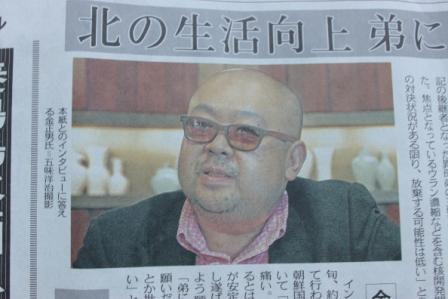TOKYO -- North Korean leader Kim Jong-il was against a third-generation power succession, but had no other option in order to stabilize the troubled communist regime, a Japanese newspaper quoted Kim's eldest son as saying in its Friday edition.
Kim Jong-nam, believed to be in his late 30s, has lived abroad for years after apparently falling out of favor with his father for attempting to enter Japan on a fake passport in 2001. He was also quoted as telling a Japanese TV station last October that he opposed the ongoing power transfer to his younger brother, Jong-un.
 |
Kim Jong-nam, picutred in a Japanese newspaper (Yonhap News) |
"Even Chairman Mao Zedong of China did not enforce hereditary succession," Kim was quoted as telling the Tokyo Shimbun earlier this month in an exclusive interview held in a southern Chinese city. "(Hereditary succession) does not fit with socialism, and my father was against it as well."
The Japanese daily did not specify exactly when or where the interview was conducted.
Kim Jong-il is believed to be preparing to hand over the reins to his third and youngest son after naming him a four-star general and giving him top Workers' Party posts in September. The heir apparent has since been accompanying his father at various public and diplomatic events, including a massive military parade and meetings with senior Chinese envoys.
"My understanding is that (the power succession) is intended to stabilize the internal system. North Korea's instability leads to instability in the region," Kim Jong-nam said.
The eldest son also said he regularly gave his opinions to his father and maintained good relations with some of the leader's top aides, such as Kim Jong-il's 64-year-old sister, Kim Kyoung-hui, and her husband, Jang Song-thaek, who is vice chairman of the powerful National Defense Commission.
On rumors that Jong-un tried to assassinate him or that he was seeking asylum abroad, Kim Jong-nam said they were "groundless rumors" and that he had "never felt threatened."
Kim Jong-nam also characterized North Korea's deadly Nov. 23 shelling of a South Korean border island as an attempt to justify the regime's nuclear programs and military-first policy. The attack may also have served to highlight the North's claims that the targeted area was a disputed territory, he said.
The eldest son also expressed a "genuine wish" that his heir apparent brother would improve the living conditions of the North Korean people, adding that he was not trying to challenge or criticize him.
"My heart aches when I hear news" of the poverty in North Korea, he was quoted as saying.
(Yonhap News)
<한글뉴스>
北 김정남 "김정일도 원래는 세습 반대" <日紙>
(도쿄=연합뉴스) 이충원 특파원 = 북한 김정일 국방위원장의 장남인 김정남이 일본 신문과 인터뷰에서 "아버지(김정일)는 (3대) 세습에 반대였지만, 국가 체제를 안정시키기 위해 어쩔 수 없었다"는 인식을 드러낸 것으로 알려졌다.
도쿄신문은 28일 "이달 중순 중국 남부 한 도시에서 김정남과 단독 인터뷰를 했 다"고 보도했다.
김정남은 이 인터뷰에서 "때때로 (아버지에게) 직접 의견을 전달하고 있다"며 "
(김정일을 보좌하는 김경희나 장성택과도) 좋은 관계를 지속하고 있다"고 말했다.
후계 구도에서 밀려난 이후에 퍼진 암살미수설이나 중국 등으로의 망명설도 "근거가 없는 소문이다. 위험을 느낀 적은 없다"고 부인했다.
동생인 김정은으로의 후계 체제가 구축된 데 대해서는 "중국의 모택동 주석조차 세습하지는 않았다"며 "사회주의에 어울리지 않고, 아버지(김정일)도 반대였다"고 말한 것으로 전해졌다. 김정남은 "(후계는) 국가 체제를 안정시키기 위한 것이었다 고 이해한다. 북의 불안정은 주변의 불안으로 연결된다"고 이해를 구했다. 김정남이 북한을 '북한'이라고 표현했는지, '북조선'이라고 말했는지는 확실하지 않다.
그는 또 북한 주민의 생활 실태에 대해 "소식을 들으면 마음이 아파진다. 생활 수준이 향상됐다고는 생각할 수 없다"며 "북이 안정되고, 경제 회복을 달성하기를 바란다. 동생(김정은)에 대한 내 순수한 바람이다. 동생에게 도전한다거나 비판하려 는 게 아니다"라고 말했다고 도쿄신문은 전했다.
또 북한의 연평도 공격에 대해서는 "(해당 지역이) 교전 지역이라는 이미지를 강조하며, 핵 보유나 선군 정치에 정당성을 부여하려는 이들이 있다"며 권력 중추로 부상한 군의 소행이라는 인식을 보였고, 북한이 2009년말에 단행한 화폐개혁에 대해 서는 "실패였다. 개혁개방에 관심을 둬야 한다. 현 상태로는 경제 대국이 될 수 없 다"고 말한 것으로 전해졌다.







![[Lee Byung-jong] The perils of political leadership](http://res.heraldm.com/phpwas/restmb_idxmake.php?idx=644&simg=/content/image/2024/12/19/20241219050082_0.jpg)
